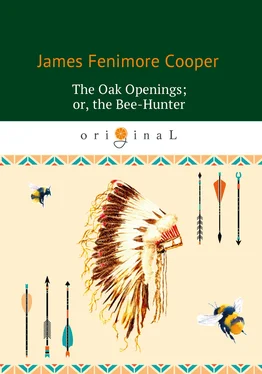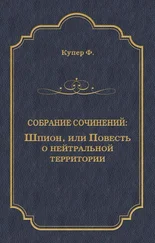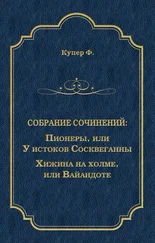He was a wight of high renown,
And thou art but of low degree;
‘Tis pride that pulls the country down —
Then take thine auld cloak about thee.
Shakespeare
The canoe did not reach the mouth of the river until near evening of the third day of its navigation. It was not so much the distance, though that was considerable, as it was the obstacles that lay in the way, which brought the travellers to the end of their journey at so late a period. As they drew nearer and nearer to the place where Gershom had left his wife and sister, le Bourdon detected in his companion signs of an interest in the welfare of the two last, as well as a certain feverish uneasiness lest all might not be well with them, that said something in favor of his heart, whatever might be urged against his prudence and care in leaving them alone in so exposed a situation.
“I’m afeard a body don’t think as much as he ought to do, when liquor is in him,” said Whiskey Centre, just as the canoe doubled the last point, and the hut came into view; “else I never could have left two women by them-selves in so lonesome a place. God be praised! there is the chiente at any rate; and there’s a smoke comin’ out of it, if my eyes don’t deceive me! Look, Bourdon, for I can scarcely see at all.”
“There is the house; and, as you say, there is certainly a smoke rising from it.”
“There’s comfort in that!” exclaimed the truant husband and brother, with a sigh that seemed to relieve a very loaded breast. “Yes, there’s comfort in that! If there’s a fire, there must be them that lighted it; and a fire at this season, too, says that there’s somethin’ to eat, I should be sorry, Bourdon, to think I’d left the women folks without food; though, to own the truth, I don’t remember whether I did or not.”
“The man who drinks, Gershom, has commonly but a very poor memory.”
“That’s true – yes, I’ll own that; and I wish it warn’t as true as it is; but reason and strong drink do NOT travel far in company – ”
Gershom suddenly ceased speaking; dropping his paddle like one beset by a powerless weakness. The bee-hunter saw that he was overcome by some unexpected occurrence, and that the man’s feelings were keenly connected with the cause, whatever that might be. Looking eagerly around in quest of the explanation, le Bourdon saw a female standing on a point of land that commanded a view of the river and its banks for a considerable distance, unequivocally watching the approach of the canoe.
“There she is,” said Gershom, in a subdued tone – “that’s Dolly; and there she has been, I’ll engage, half the time of my absence, waitin’ to get the first glimpse of my miserable body, as it came back to her. Sich is woman, Bourdon; and God forgive me, if I have ever forgotten their natur’, when I was bound to remember it. But we all have our weak moments, at times, and I trust mine will not be accounted ag’in’ me more than them of other men.”
“This is a beautiful sight, Gershom, and it almost makes me your friend! The man for whom a woman can feel so much concern – that a woman – nay, women; for you tell me your sister is one of the family – but the man whom DECENT women can follow to a place like this, must have some good p’ints about him. That woman is a-weepin’; and it must be for joy at your return.”
“‘Twould be jist like Dolly to do so – she’s done it before, and would be likely to do so ag’in,” answered Gershom, nearly choked by the effort he made to speak without betraying his own emotion. “Put the canoe into the p’int, and let me land there. I must go up and say a kind word to poor Dolly; while you can paddle on, and let Blossom know I’m near at hand.”
The bee-hunter complied in silence, casting curious glances upward at the woman while doing so, in order to ascertain what sort of a female Whiskey Centre could possibly have for a wife. To his surprise, Dorothy Waring was not only decently, but she was neatly clad, appearing as if she had studiously attended to her personal appearance, in the hope of welcoming her wayward and unfortunate husband back to his forest home. This much le Bourdon saw by a hasty glance as his companion landed, for a feeling of delicacy prevented him from taking a longer look at the woman. As Gershom ascended the bank to meet his wife, le Bourdon paddled on, and landed just below the grove in which was the chiente. It might have been his long exclusion from all of the other sex, and most especially from that portion of it which retains its better looks, but the being which now met the bee-hunter appeared to him to belong to another world, rather than to that in which he habitually dwelt. As this was Margery Waring, who was almost uniformly called Blossom by her acquaintances, and who is destined to act an important part in this legend of the “openings,” it may be well to give a brief description of her age, attire, and personal appearance, at the moment when she was first seen by le Bourdon.
In complexion, color of the hair, and outline of face, Margery Waring bore a strong family resemblance to her brother. In spite of exposure, and the reflection of the sun’s rays from the water of the lake, however, HER skin was of a clear, transparent white, such as one might look for in a drawing-room, but hardly expect to find in a wilderness; while the tint of her lips, cheeks, and, in a diminished degree, of her chin and ears, were such as one who wielded a pencil might long endeavor to catch without succeeding. Her features had the chiselled outline which was so remarkable in her brother; while in HER countenance, in addition to the softened expression of her sex and years, there was nothing to denote any physical or moral infirmity, to form a drawback to its witchery and regularity. Her eyes were blue, and her hair as near golden as human tresses well could be. Exercise, a life of change, and of dwelling much in the open air, had given to this unusually charming girl not only health, but its appearance. Still, she was in no respect coarse, or had anything in the least about her that indicated her being accustomed to toil, with some slight exception in her hands, perhaps, which were those of a girl who did not spare herself, when there was an opportunity to be of use. In this particular, the vagrant life of her brother had possibly been of some advantage to her, as it had prevented her being much employed in the ordinary toil of her condition in life. Still, Margery Waring had that happy admixture of delicacy and physical energy, which is, perhaps, oftener to be met in the American girl of her class, than in the girl of almost any other nation; and far oftener than in the young American of her sex, who is placed above the necessity of labor.
As a stranger approached her, the countenance of this fair creature expressed both surprise and satisfaction; surprise that any one should have been met by Gershom, in such a wilderness, and satisfaction that the stranger proved to be a white man, and seemingly one who did not drink.
“You are Blossom,” said the bee-hunter, taking the hand of the half-reluctant girl, in a way so respectful and friendly that she could not refuse it, even while she doubted the propriety of thus receiving an utter stranger – “the Blossom of whom Gershom Waring speaks so often, and so affectionately?”
“You are, then, my brother’s friend,” answered Margery, smiling so sweetly, that le Bourdon gazed on her with delight. “We are SO glad that he has come back! Five terrible nights have sister and I been here alone, and we have believed every bush was a red man!”
“That danger is over, now, Blossom; but there is still an enemy near you that must be overcome.”
Читать дальше












